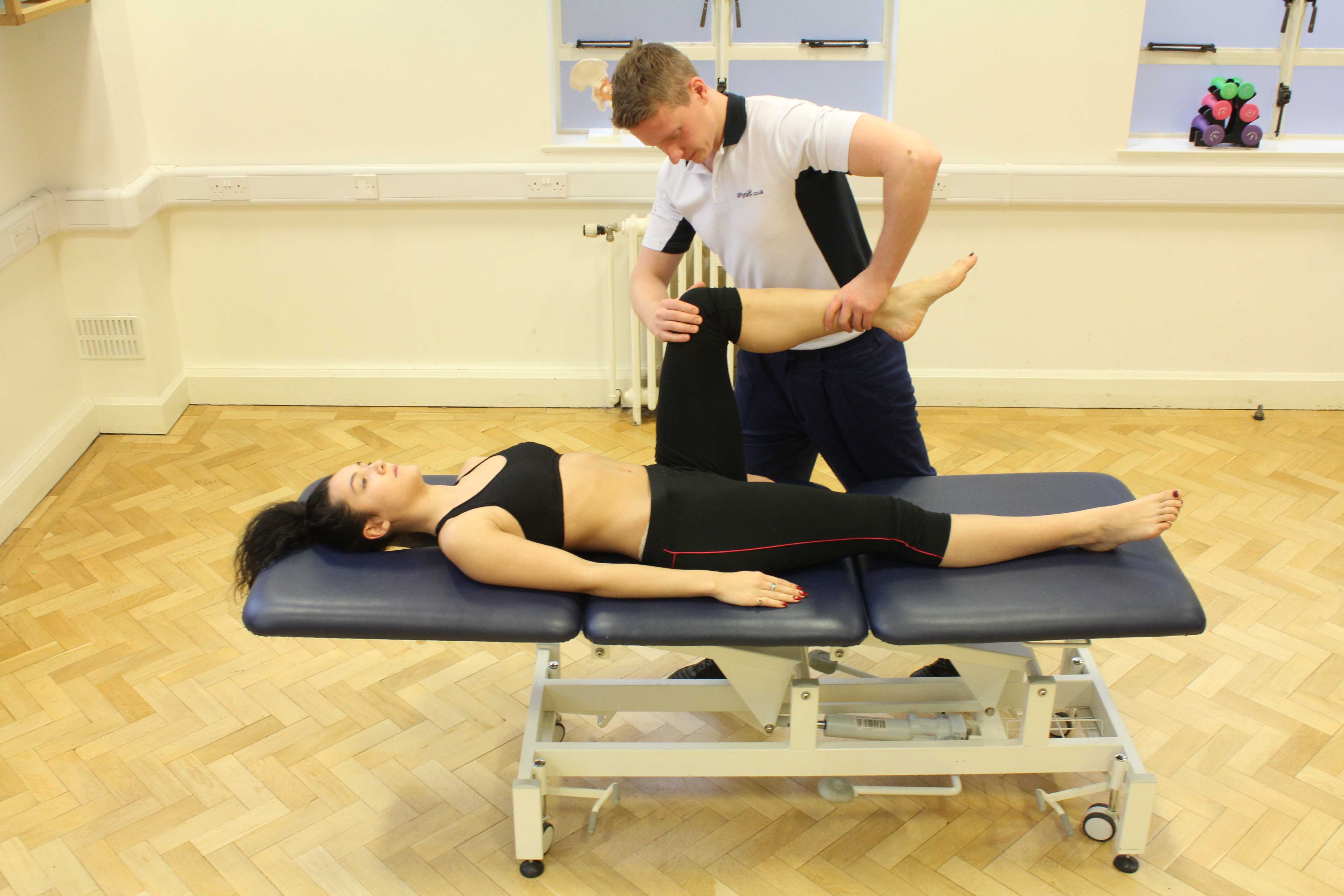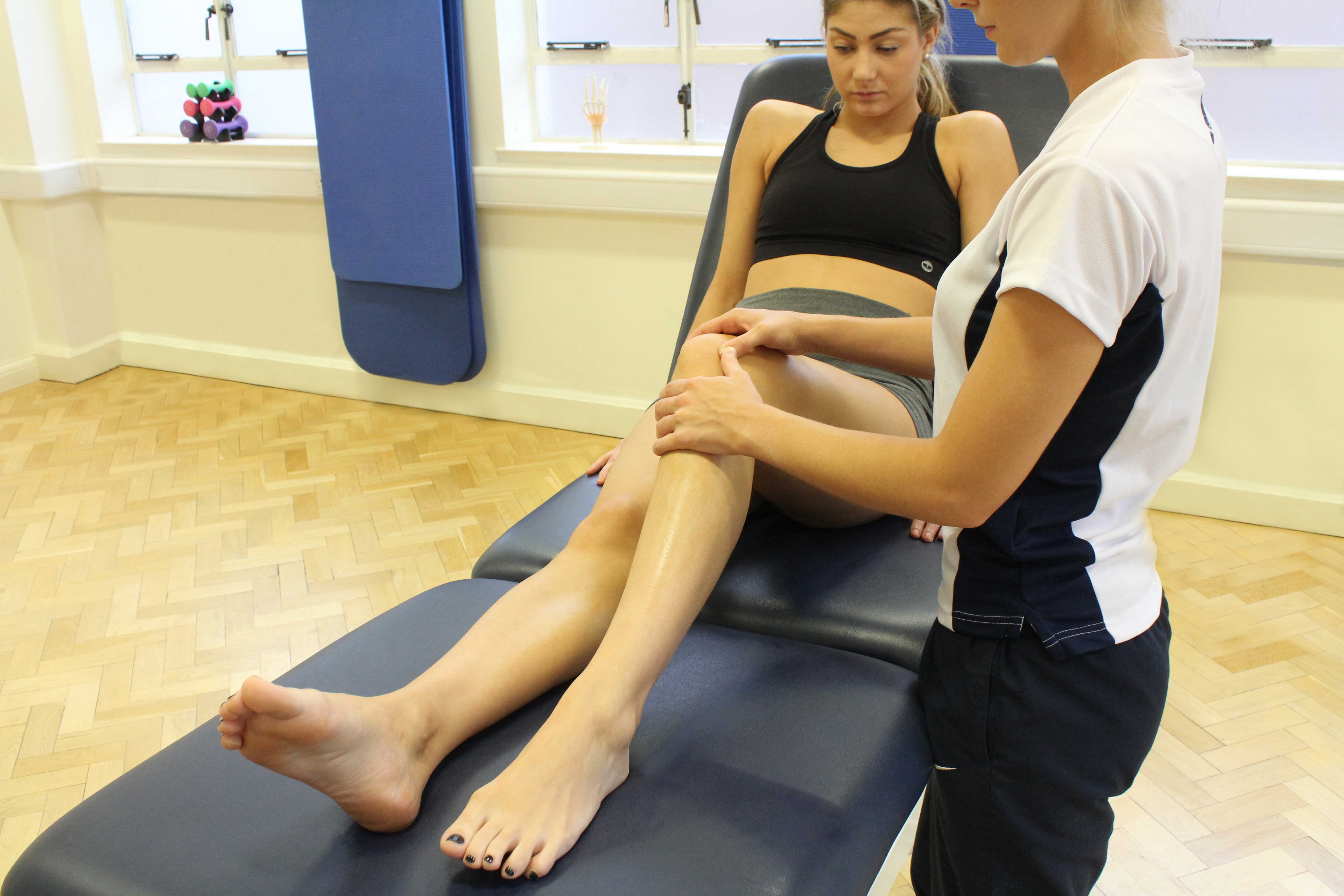What is anterior knee pain?
Anterior Knee Pain, often referred to as Patellofemoral Pain Syndrome, specifically refers to painful symptoms experienced in and around the front of the knee. Anterior knee pain can affect anyone regardless of age or occupation, but most frequently afflicts the young, particularly women, engaged in frequent sports activity.
The prolonged and repetitive action of bending the knee during activities such as running, jumping, squats or even sitting can contributed the development of anterior knee pain. It is a condition that often affects both knees at the same, although usually one more than the other.
 Above: Therapist performing knee assessment
Above: Therapist performing knee assessmentWhat causes anterior knee pain?
There are multiple potential causes for the presence of anterior knee pain. The most commonly acknowledged reason is overuse or repetitive strain, typically from frequent participation in sports. The actions performed that aggravate the condition include repetitive deep knee bends, either from running, jumping or squatting.
Biomechanical abnormalities create inefficient movements, placing additional stress and wearing on parts of the knee. It may involve minor alignment issues of the patella within the knee, or having flat feet that alter your normal gait pattern. There may be muscle strength imbalances around the hips or knees causing uneven stress to the joint structures during intense activity.
Some conditions may cause anterior knee pain or develop as a result of unusual biomechanical stresses. Such conditions could include Bursitis, Patellar Tendinopathy or arthritis. Joint hypermobility can produce excessive wearing and instability within the joint, contributing to possible patellar misalignment the increased risk of patellar subluxation or even dislocation. These conditions and minor injuries can cause pain and further weaken the knee structure, increasing the risk of further injury, especially amongst the very active.
What are the symptoms of anterior knee pain?
The symptoms experienced from anterior knee pain will vary depending on the underlying cause and the extent of the damage or biomechanical abnormality present. Symptoms common to most presentations of anterior knee pain include;
- Pain experienced at the front of the knee structure that is difficult to localise.
- Pain often presents in both knees, but affects one side more than the other.
- Knee movement causes pain even when performed passively (without muscle action).
- Knee is stiff after prolonged periods resting, especially upon awakening.
- Pain is worse following activity, particularly sports participation or descending stairs.
- Swelling may be present in and around the joint.
- Sensation of clicking or grinding in the joint, sometimes audible.
 Above: Therapist performing soft tissue massage on the patella and surrounding connective tissue.
Above: Therapist performing soft tissue massage on the patella and surrounding connective tissue.How is anterior knee pain diagnosed?
Anterior knee pain can be clinically diagnosed by a doctor or physiotherapist following an assessment. A subjective history will confirm how the symptoms began and a thorough physical assessment will confirm the presence of symptoms whilst ruling out other conditions. In particular the examiner will look for developmental conditions in younger clients and signs of traumatic injury in older clients. There is always the possibility that your knee pain may be referred from either your hip or back, even when you only experience pain in the knee. Careful diagnosis is important to identify the underlying cause of the pain, so appropriate treatment can be applied to correct it successfully.
For more information about how physiotherapy can help with knee pain, or to book an appointment please email office@physio.co.uk or call 0330 088 7800.
What would a physiotherapy assessment for anterior knee pain involve?
At Liverpool Physio, we want to gain as much information as possible about your injury to ensure we give you the best treatment. In your first appointment with us, our physiotherapists will carry out an assessment which has two parts:
Subjective
A discussion between you and our physiotherapist to find out the cause of your injury and what symptoms you are experiencing, and how your injury is affecting you and your lifestyle.
Objective
An assessment of your range of pain, range of movement, and a series of special tests to identify the presence of anterior knee pain.
Whatever the cause of your anterior knee pain the thorough assessment process at Physio.co.uk allows our experienced Physiotherapists to tailor a treatment programme to target the cause and achieve the best possible recovery.
What would physiotherapy treatment for anterior knee pain involve?
Following a thorough assessment to ascertain the underlying cause of the anterior knee pain the physiotherapist can provided targeted treatment to address your symptoms. Treatment choices will vary depending on the assessed cause of your pain and will be adjusted to take account of any corrective surgery you may have received. In most cases anterior knee pain can be successfully treated conservatively with some of the following treatments;
- Heat treatments, including ice therapy, to relieve pain and swelling.
- Soft tissue massage to alleviate stiffness, pain and disperse swelling.
- Stretching exercises to lengthen tight muscles and restore flexibility.
- Progressive strengthening exercises to improve stability and correct muscle imbalance.
- Advice on activity modification to avoid re-injury during recovery, or in the future.
- Advice on the use of orthotics to correct biomechanical abnormalities.
- Joint mobilisations to relieve stiffness and correct patella position.
- Taping techniques to improve joint and patella position, raising joint proprioception.
Your physiotherapy rehabilitation programme will be tailored by your therapist based on your lifestyle and recovery goals. It will address your symptoms of pain and facilitate a confident return to normal activities and sports in the quickest possible time.
For more information about how physiotherapy can help with knee pain, or to book an appointment please email office@physio.co.uk or call 0151 558 0071.
How can I arrange a physiotherapy assessment for anterior knee pain?
If you are experiencing generalised pain at the front of the knee, loss of stability or mobility and show signs of inflammation, you may have anterior knee pain and you would benefit from seeing one of our physiotherapists at Physio.co.uk.
You can contact us directly to arrange an assessment and we can advise you if further treatment is recommended, or give you details on self-management for minor cases. To arrange an appointment please email office@physio.co.uk or call 0330 088 7800.
Summary
Anterior knee pain or Patellofemoral Pain Syndrome can vary from mild to severe and affect people of all ages and occupations. Mild cases may be resolved with simple activity modification and targeted exercises. Only the most severe cases will require surgical intervention and physiotherapy can still help speed recovery and restore normal joint function. Treatment techniques will involve pain relief, mobilisation exercises, improved joint stability and functional strengthening exercises. You will also be given appropriate advice to facilitate your own recovery and prevent further injury. Throughout the treatment process our rehabilitation programme will focus on the best possible functional recovery in the quickest possible time. For more information about how physiotherapy can help with knee pain, or to book an appointment please email office@physio.co.uk or call 0330 088 7800.

 0330 088 7800
0330 088 7800





































